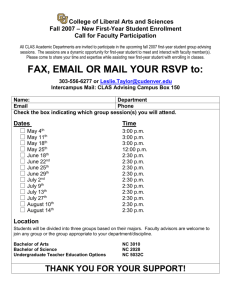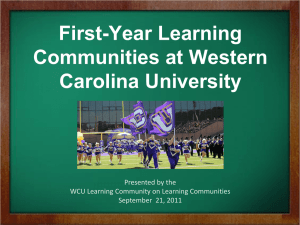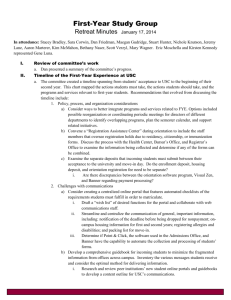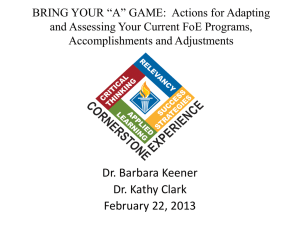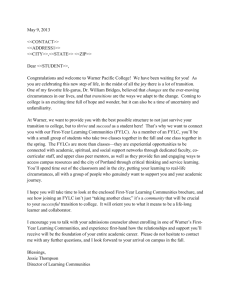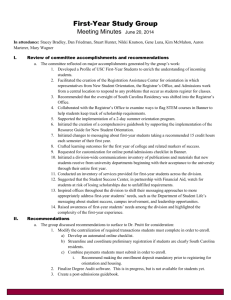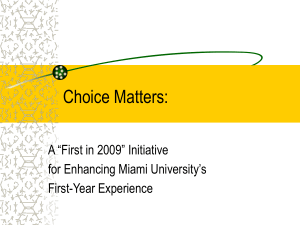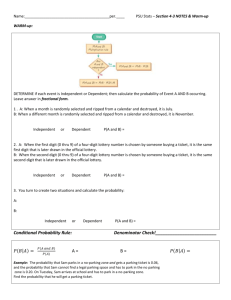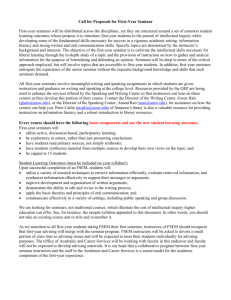Response - The Evergreen State College
advertisement
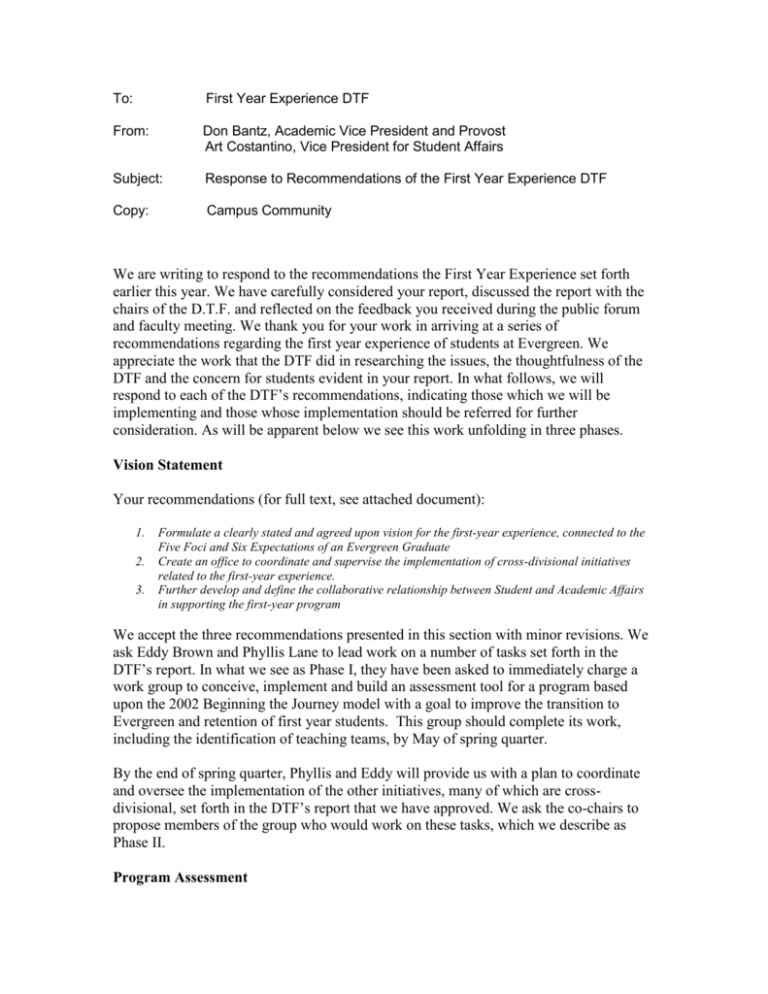
To: First Year Experience DTF From: Don Bantz, Academic Vice President and Provost Art Costantino, Vice President for Student Affairs Subject: Response to Recommendations of the First Year Experience DTF Copy: Campus Community We are writing to respond to the recommendations the First Year Experience set forth earlier this year. We have carefully considered your report, discussed the report with the chairs of the D.T.F. and reflected on the feedback you received during the public forum and faculty meeting. We thank you for your work in arriving at a series of recommendations regarding the first year experience of students at Evergreen. We appreciate the work that the DTF did in researching the issues, the thoughtfulness of the DTF and the concern for students evident in your report. In what follows, we will respond to each of the DTF’s recommendations, indicating those which we will be implementing and those whose implementation should be referred for further consideration. As will be apparent below we see this work unfolding in three phases. Vision Statement Your recommendations (for full text, see attached document): 1. 2. 3. Formulate a clearly stated and agreed upon vision for the first-year experience, connected to the Five Foci and Six Expectations of an Evergreen Graduate Create an office to coordinate and supervise the implementation of cross-divisional initiatives related to the first-year experience. Further develop and define the collaborative relationship between Student and Academic Affairs in supporting the first-year program We accept the three recommendations presented in this section with minor revisions. We ask Eddy Brown and Phyllis Lane to lead work on a number of tasks set forth in the DTF’s report. In what we see as Phase I, they have been asked to immediately charge a work group to conceive, implement and build an assessment tool for a program based upon the 2002 Beginning the Journey model with a goal to improve the transition to Evergreen and retention of first year students. This group should complete its work, including the identification of teaching teams, by May of spring quarter. By the end of spring quarter, Phyllis and Eddy will provide us with a plan to coordinate and oversee the implementation of the other initiatives, many of which are crossdivisional, set forth in the DTF’s report that we have approved. We ask the co-chairs to propose members of the group who would work on these tasks, which we describe as Phase II. Program Assessment Your recommendations (for full text, see attached document): 1. 2. 3. 4. 5. 6. Consult with people skilled at developing and assessing objectives to identify what a comprehensive assessment of Initiatives for First-year Students would look like. Gather and analyze data drawn from assessments based on this comprehensive assessment plan, to determine effective uses of resources. Assess first-year students’ writing, critical reading and quantitative reasoning skills prior to the beginning of Fall Quarter and distribute these results to faculty by week one of Fall Quarter. Assess through traditional and creative means all first-year experience programs to identify best practices and areas for improvement. Conduct a comparative assessment of first-year student success and persistence in Core, LowerDivision, and All-Level programs Provide adequate resources to implement the above assessments. We approve the direction set forth in this section. Cost estimates for this work are being developed as we plan our 2007-2009 operating budget. Beginning the Journey Your recommendations (for full text, see attached document): 1. 2. Re-institute Beginning the Journey in the 2007-2008 academic year, or as soon as feasible. Coordinate BTJ jointly by Student Affairs and Academic Affairs with clearly defined roles and responsibilities, and an intentional focus on both academic content and learning processes. We accept the recommendations set forth in this section and ask that the planning begin immediately so that a Beginning the Journey program can be implemented in Fall 07’. Final and complete implementation of the recommendations in this section are contingent on our review of the final plan for Beginning the Journey and obtaining the funding as set forth in the Governor’s Budget recommendations. Advising and Academic Planning Your recommendations (for full text, see attached document): 1. 2. 3. Place a registration hold on the accounts of first-year students who do not complete the new student advising workshop or an equivalent advising/academic planning session prior to week 3 of their first quarter of enrollment. Implement a second phase workshop in coordination with Academic Advising, related to academic planning. Implementation by faculty of a systematic approach for advising students and helping them learn to develop academic plans. The first recommendation in this section related to mandatory advising is already being implemented at the request of the Vice President for Student Affairs. The second recommendation in this section could be tested as part of the Beginning the Journey program. The third recommendation is currently under consideration by the Governance Groups DTF: Curricular Visions. It may be that recommendation three will be subject to collective bargaining, in which case we will need to wait to complete the negotiation process before implementation can occur. Faculty Participation Your recommendations (for full text, see attached document): 1. Create governance assignments that involve faculty in New Student Orientation, Freshman Advising Day, and Advising Festivals. The provost will work with the Agenda Committee to create governance assignments as suggested in this recommendation in the 07-08’ academic year. Faculty Development Your recommendations (for full text, see attached document): 1. 2. 3. 4. 5. 6. Encourage and sponsor Core faculty participation in the Washington Center’s National Project on Assessing the Learning in Learning Communities. Develop other initiatives and workshops for faculty related to effective pedagogies and assessment for first-year students, including but not limited to, effective teaching of writing and quantitative reasoning. Assist faculty in determining how assessment is aligned with learning objectives and program goals, and how to use assessment outcomes to improve curricula and student learning. Hold a bi-quarter seminar for faculty teaching in Core and All-Level programs in developmental issues and learning pertaining to first-year students. Increase faculty familiarity and use of student support services. Provide support for several Core faculty to attend the Annual Conference on the First-Year Experience. We accept recommendations 1-6 in this section. The provost has already met with the Washington Center to begin the implementation of recommendations 1-5. Additionally, the Provost’s office funded two faculty teaching core next year to attend the First Year Experience Conference in February. Core Faculty Cohort Your recommendations (for full text, see attached document): 1. 2. 3. 4. Develop ongoing faculty cohorts to teach Core for 2-4 years. Provide incentives for faculty who are part of the Core cohort in order to adequately compensate faculty for the extra work involved in this assignment. Provide support and resources for writing, quantitative reasoning, multiculturalism, and developing college level management skills implemented in coordination with the directors of the Writing Center and Quantitative and Symbolic Reasoning Center, Student & Academic Support Services, and library faculty. Continue to offer the Core Planning Institute. We approve the direction set forth in this section. The first recommendation in this section has been forwarded to the Curriculum Visions DTF for further consideration by the faculty. Since the second recommendation may impact faculty working conditions, it is subject to the upcoming collective bargaining agreement. Partial funding of your third recommendation will be considered for the 2007-2009 operating budget but must be assesses against multiple competing campus needs. As requested in recommendation four, the Core planning institute will continue to be offered. Community Connectedness and Sense of Belonging In-Program Your recommendations (for full text, see attached document): 1. 2. 3. 4. 5. 6. Send a summer letter of welcome to incoming students from faculty Assign student mentors for first-year students in All-Level programs. Meet with first-year students during Orientation week, by the third week of the quarter, and during week five. Inform the Dean of Student and Academic Support Services (SASS) by Week 5 of students that may lose credit so that professional staff in SASS can coordinate additional support. Explore how faculty might systematically mentor first-year students who need extra support Problem-solve collaboratively when first-year students present particular challenges related to learning disabilities, emotional challenges, etc. Campus Wide Your recommendations (for full text, see attached document): 1. 2. 3. 4. 5. 6. 7. 8. 9. Involve staff and returning students in the new student orientation program. Recruit faculty who will be teaching first-year students, staff, the Provost and other vicepresidents, the deans, etc., to meet and help first-year students check into the residence halls. Have S&A members, student athletes and other student leaders on hand to help with move-in. Provide first-year students with a continuing student “buddy” for at least the first few weeks of the quarter to orient them to campus life. Work with the Geoduck Union, Housing and the S&A Board to create a class identity for each incoming class in order to increase sense of belonging and to create targeted outreach. Hold a Social week for commuter students during week 1 or 2 in order to help them create community and to develop support networks. During Week 8 hold another event for commuter students to provide opportunities for them to check-in with each other and with advisors. Encourage first-year students to become involved with Evergreen in addition to their academic programs. Develop a student employment position for a “Campus Concierge” program that would be available seven days a week to answer questions. Conduct an audit to determine what types of messages we are conveying to new students, to determine if we live up to the messages we convey. 10. We approve the direction set forth in this section and cost estimates for this work are being developed as we plan our 2007-2009 operating budget. It is our understanding that when the DTF presented their recommendations to the Campus, that concern was expressed that the College not forget transition needs of transfer students. When we met with the co-chairs of the DTF to discuss the report, we learned that the DTF did not have time to undertake a through review of New Student Orientation. We know that there are important issues associated with the length, timing, content and staffing of New Student Orientation. We anticipate that Phase I and II of this work will consume most of the upcoming year with the planning and implementation of Beginning the Journey and with the implementation of the recommendations of the First Year Experience DTF that have been approved. However, we ask that by the end of May 2008, the Phase II cross-divisional workgroup forward recommendations for a workgroup and timeline to review Orientation and examine the transition needs of transfers. We know that the composition of the workgroup will likely need to be altered at that point, given the shift in focus and necessity for more assessment and planning. It may be that the new group will incorporate some individuals and ideas from the work of the Curriculum Visions DTF. (Faculty appointments to all groups must be approved by the Agenda committee and student appointments may need to be coordinated through the Geoduck Union.) In summary, Phase I work should commence now and conclude by May, 2007. Phase II work will begin in May, 2007 and conclude in May, 2008. Phase III work will begin in May, 2008 with a yet to be determined conclusion date. We look forward to supporting the ongoing work necessary to ease the transition of all new students to Evergreen and enhance student retention and success. We would be happy to meet with members of the DTF to discuss and/or clarify our response to your recommendations. Thank you again for your work.
